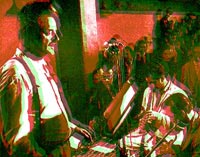Santa Barbara, 1971, my senior year:
the bank we burned the year before
now rebuilt on a ground of ashes.
But because the war was not over
because we were young and determined,
we still swelled the Isla Vista streets,
our protests turning into running battles
against the cops and their clubs and tear gas.
Because we were young and determined
we performed on stage in “Poetry in Song.”
Kenneth, in bedroom slippers,
front row center, less a teacher than
a grand master of ceremonies
let his students do every Monday night
whatever they wanted, however they wanted.
I wrote blues songs, protest songs,
performed them as poorly as everyone else.
But then, because I was young and determined
I spoofed myself and all the other
ardent ragtag folk singers
by playing a guitar as if it were a saxophone.
After an interminable amount of tuning
I tipped the neck to my mouth,
pumped out with my vocal chords
a few bars of “Perdido.”
A few laughed. A few booed.
Kenneth, leaning back in his chair,
guffawed until tears began to run from his sad eyes.
And instead of his usual, “Next,”
bellowed out something about Dada
being the supreme protest.
The next Monday, I played the typewriter
while humming “Railroad Bill.”
After the typewriter serenade
I met with him for my second “conference.”
The first had lasted five minutes.
I wanted to talk, but couldn’t.
He didn’t want to talk, and wouldn’t.
A friend said that was the way
it was with Kenneth, at least
that was the way it was with guys.
“He’ll only talk to chicks.”
But because I was young and determined
this time I came prepared, my grandfather’s copy of
The Little Red Songbook in my pocket.
And this time it was different.
We talked about Dada, about Satie
and Reverdy, about Paris and San Francisco
about riding the rails
about the farmworker strikes
and about the war.
I finally produced my grandfather’s well-worn book
of union hymns and presented it to him.
His eyes lit up, his drooping mustache
lifted as he smiled.
“I won’t keep it,” he said.
“It’s a present,” I said.
He opened it and began to sing.
I sang along.
“Sing ‘Railroad Bill,’” he said. “You hummed it
over the typewriter the other night.
I’ve forgotten the words.”
And there in his stark office
in South Hall I sang a few verses.
“Never heard that version,” he said.
“Maybe my grandfather
made up those words,” I said.
“Then your grandfather was a poet,” he said.
Are you?”
I didn’t know what to say, just shrugged.
“Bring me some work,” he said.
I had scored, and I wasn’t even a chick.
Sundays at Montecito
Kenneth supplied the booze and some food.
We supplied the dope.
The women supplied themselves.
I usually went with Alice.
I had the hots for Alice,
she had the hots for Kenneth.
and Kenneth, she claimed, had the hots for her.
We all envied Kenneth.
Envied his fame, his gift, his experience,
envied that at 66 he had far more success
with women than we did. We were
young and determined. He was old and accomplished,
and no less determined. Indomitable. Fierce. Alive.
And then there was that special Sunday
when Kenneth read. Read his Japanese poems,
read “The Heart’s Garden, The Garden’s Heart.”
And as the wind gently blew through the Montecito trees
he read us the poem that would become his epitaph:
“As the full moon rises
the swan sings
in sleep
on the lake of the mind.”
|

